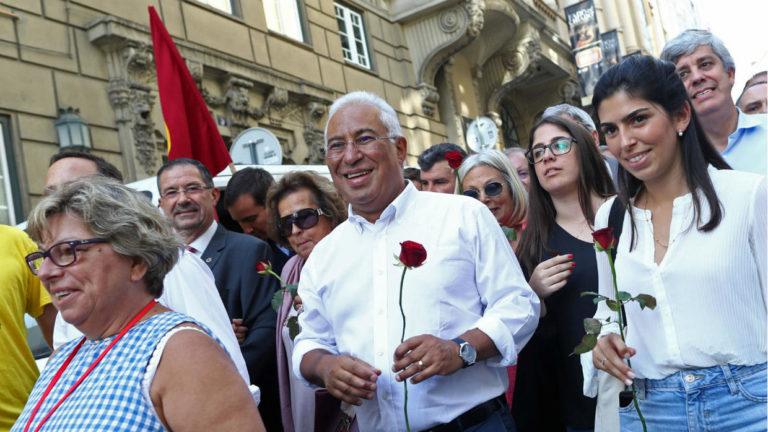Centre-Left Socialists Re-elected in Portugal

Portugal’s Socialist Prime Minister Antonio Costa (C) won re-election in parliamentary poll on October 6, 2019
The renewed mandate secured by Portuguese Prime Minister António Costa’s Socialist Party minority government in Sunday’s parliamentary poll carries a special flavour for India.
India has a claim over the cordial Senhor Costa, whose father Orlando da Costa was a writer from the former Portuguese colony of Goa and a communist activist who fought against the dictatorship in Portugal, was harassed by the secret service and thrown in prison several times; his books were banned.
António Costa’s politics has contemporary relevance for India insofar as he has bucked the trend of declining fortunes for Europe’s centre-left. While on campaign trail, Costa toured through Portugal, traveling along National Road 2, which cuts across the country from the mountainous north on the border with Spain and ended up in the south in Faro, 700 kilometers away on the beaches of the Algarve.
It was a masterstroke. The trip gave voters and Costa the possibility to communicate with each other their concerns directly — the leader his vision and the people with the issues that affect their lives such as overcrowded schools; the difficulties associated with an overwhelmed justice system; and the long waiting times for appointments with medical specialists.
But Costa is anything but a demagogue or dream merchant holding out seductive promises to garner votes. He is different from the run-of-the-mill politician anywhere who is driven by the lust for personal power. Even political opponents acknowledge Costa’s honesty and the total transparency in his politics.
Costa’s greatest accomplishment must be the arrangement he worked out whereby he would be tolerated by leftist parties — parties like the still-orthodox Communist Party, the Greens and the Marxist Left Bloc. While heading the minority government four years ago, he had an option to take support from the centre-right parties but he preferred the three leftist groups and struck agreements with each of the three groups, relying on his negotiating skills.
This time around too, there is talk that Costa already has a deal with the charismatic head of the Communist Party, Jerónimo de Sousa. Looking back, both politicians have reason to be satisfied about the raison d’être of their “non-coalition” (which bears a curious resemblance to the working relationship between the Congress Party and the Left in India during the UPA-1.)
Indeed, socialists and communists have a difficult history of co-habitation, but in Portugal it worked brilliantly and in turn enabled Costa to not only increase his party’s vote share in Sunday’s election but fundamentally restore the population’s trust in government.
Costa says, “We did everything that we promised,” while the communist leader Sousa modestly agrees that “It (the “non-coalition”) was worthwhile.” Recently, Costa explained why an outright coalition with the communists may not be such a good idea — “It is better not to destroy a good friendship with a bad marriage.”
Indeed, the “non-coalition” is riddled with contradictions. But the good thing has been that both Costa and Sousa have mutual respect and they are acutely conscious that a fragmentation of the left should be avoided at all costs.
Sousa understood Costa’s compulsions to pursue policies that attract centrist voters. Thus, communists did not object when Costa brought in the Harvard-educated economist Mário Centeno as his finance minister, who stuck to the eurozone Stability Pact and the stabilising course based on austerity that it entailed.
But Costa also made concessions to the leftists: The minimum wage, pensions and salaries of public servants were increased. One of Costa’s campaign promises this time around is that the government will invest 10 billion euros in the rail network, road construction, schools and hospitals.
Costa created hundreds of thousands of new jobs. Unemployment in Portugal is around 6 percent today, the lowest since 2000. The economy’s annual growth rate of 2 percent is higher than the EU average. There has been a boom in tourism. Today, Lisbon is one of the most popular cities in Europe. It is a startup hub and the annual Web Summit brings tens of thousands of digital experts to Lisbon.
Being a China-friendly EU nation also helped Portugal to survive the hard times. During the debt crisis, Beijing came to Lisbon’s rescue. China, for instance, bought Portuguese government bonds, which nobody else wanted at the time. Chinese companies pumped billions of euros into Portugal since the debt crisis beginning in 2010. They purchased a number of Portuguese firms, including the previously state-owned power grid operator REN, the nation’s largest insurance company, private hospitals as well as banks.
As an analyst put it,“When Portugal was facing difficult times, the EU imposed tough austerity measures, while China pumped billions into the country. Now Portugal’s prime minister is speaking out against a tougher EU course against China.” Due to China’s growing economic engagement in Portugal, Costa has emerged as one of the staunchest supporters of Chinese investment in Europe.
In recent years, Costa has repeatedly positioned himself as a friend and sympathiser of China. To quote a Lisbon academic, “Antonio Costa is not the Trojan horse of the Chinese in the EU. He is their war horse.”
In Sunday’s election, Costa’s Socialist Party secured 106 seats in the 230-seat parliament, 10 seats short of the number required to form a government. Costa is expected to lead another minority government with outside support from the Communist Party and Marxist Left Bloc.
The Communist Party and the Marxist Left Bloc, which got 32 seats, will ensure the stability of Costa’s second government. The political rationale behind their “non-coalition” stands vindicated: In Sunday’s polls the center-right Social Democratic Party had one of the worst results in its history, with 28% of the vote and 77 seats in parliament.
The big picture, however, is that Europe’s social democrats are currently struggling. The best hope for European social democracy comes from the Iberian Peninsula. Prime Minister Pedro Sanchez came out victorious in Spain’s snap general election in April, with his Socialist party PSOE winning nearly 30% of the vote. Costa’s Partido Social Democrata has performed better, polling 36 percent.
Get the latest reports & analysis with people's perspective on Protests, movements & deep analytical videos, discussions of the current affairs in your Telegram app. Subscribe to NewsClick's Telegram channel & get Real-Time updates on stories, as they get published on our website.



















